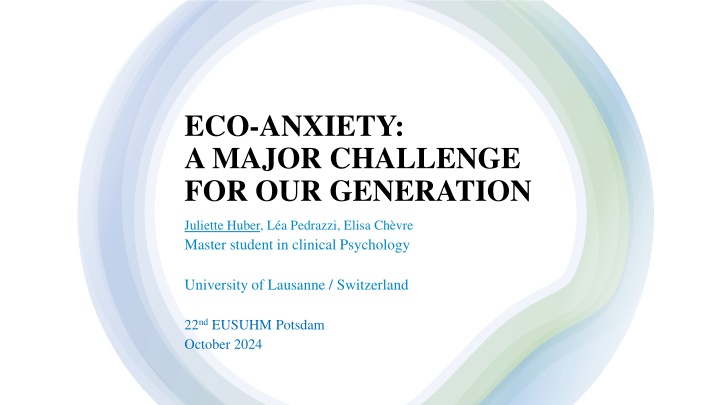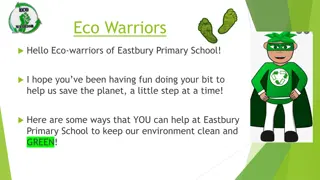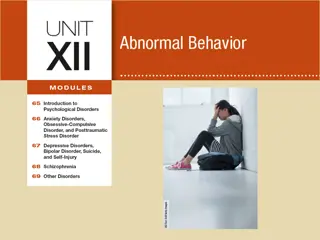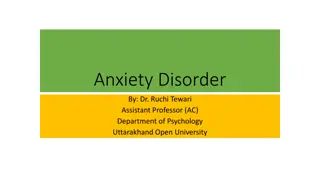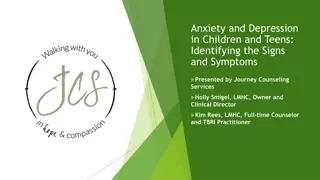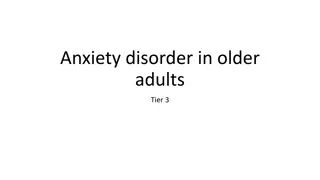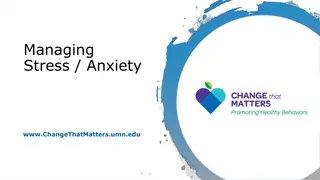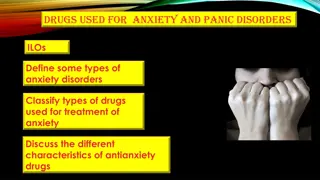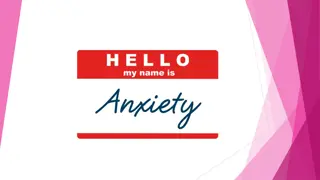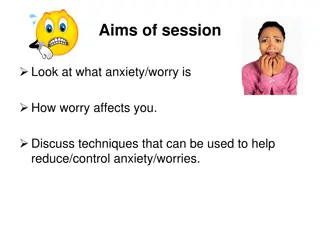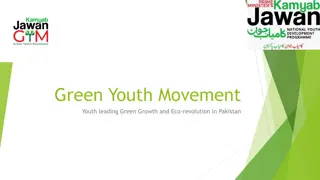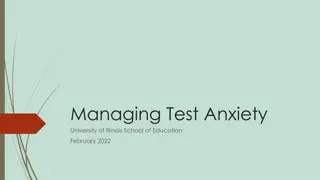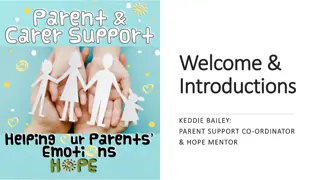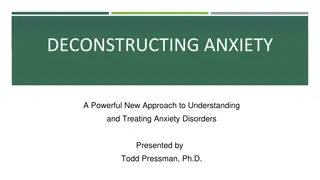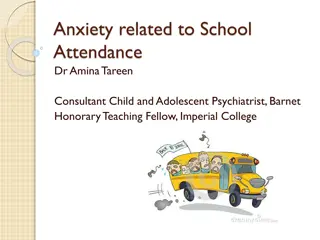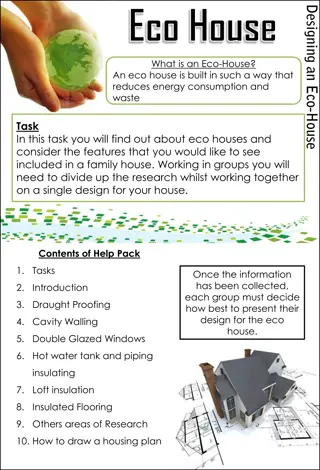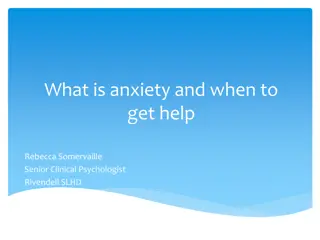Eco-Anxiety: A Major Challenge for Our Generation
Eco-anxiety is a growing concern globally, leading to distress due to increased awareness of climate change. This study delves into the impact of eco-anxiety, exploring how individuals cope and engage with environmental issues.
Download Presentation

Please find below an Image/Link to download the presentation.
The content on the website is provided AS IS for your information and personal use only. It may not be sold, licensed, or shared on other websites without obtaining consent from the author.If you encounter any issues during the download, it is possible that the publisher has removed the file from their server.
You are allowed to download the files provided on this website for personal or commercial use, subject to the condition that they are used lawfully. All files are the property of their respective owners.
The content on the website is provided AS IS for your information and personal use only. It may not be sold, licensed, or shared on other websites without obtaining consent from the author.
E N D
Presentation Transcript
ECO-ANXIETY: A MAJOR CHALLENGE FOR OUR GENERATION Juliette Huber, L a Pedrazzi, Elisa Ch vre Master student in clinical Psychology University of Lausanne / Switzerland 22ndEUSUHM Potsdam October 2024
Table of Content 1. Definition 2. Background 3. Research Question 4. Methods 5. Results 6. Hypothesis 7. Limitations 8. Conclusion 2
1. Definition How do you understand the term eco-anxiety ? Eco-anxiety : A sense of distress due to a global awareness of climate change (Benoit et al., 2021; Godden et al., 2021; Reyes et al., 2021; Sternudd, 2020; Strife, 2011 in Brophy et al., 2022) 3
2. Background Eco-anxiety is a main concern in most continents (Petit et al., 2022) Climate change has negative effects on human health (Brophy et al., 2022; Watts et al., 2019) The effects can also be on an emotional level (Hickman et al., 2021) Eco-anxiety is connected to symptoms such as frustration and feeling helpless ( goston et al., 2022) Coping mechanisms are used to get trough this fear ( goston et al., 2022) Eco-anxiety can be useful because it may help for adaptation mechanism (Kurth, 2018) 4
3. Research Question How does experiencing eco-anxiety push individuals to take more proactive measures in favor for the environment? 5
4. Methods The qualitative approach focused on participants' lived experiences Exploratory research 3 semi-structured flexible interviews with guided and open-ended questions Analysis: Coding of the interviews to identify key themes Braun & Clarke s method used (2006): familiarisation, coding, theme organisation 6
5. Results Six different categories emerged as the main trends in our data: 1. Emotional management 2. Political and environmental engagement 3. Social responsibility 4. Resources 5. Social impact 6. Expectations and perspectives for the future 7
5. Results : Emotional management Disagreement over the definition of the term Eco-anxiety VS eco-anger No, it's more about anger, because we already know, from the media, we've known very well since the 1980s about the existence of this problem. Marc, 28 I would say that eco-anxiety is somewhat this feeling of powerlessness that leads to anxiety, this feeling of helplessness in the face of climate change. Laura, 22 8
5. Results : Emotional management Themes of mental burden In everyday life, I try to produce as little waste as possible each time, but it takes time, mental energy Laura, 22 I try, I never take the plane, I ve flown only once in my life, I almost don t eat meat, and I use all my things for a very long time I really try to do a lot of things like that. Marc, 28 9
5. Results : Political and Environmental Engagement Not feeling seen nor heard Coping by being as eco-friendly as possible You hear that a lot of things are being put in place. Like, yeah, that's it. But in reality, nothing is really happening. Marie, 25 But do I feel heard? Well, I don t think so, it s just that they do whatever they want. Marie, 25 10
6. Hypothesis Sense of global denial Eco- anger/anxiety Political engagement becomes passive Dissatisfaction with the system Feeling unseen and unheard 11
7. Limitations A qualitative method involves a specific context Results cannot be generalized The data are subjective Lack of heterogeneity 12
8. Conclusion Eco-anxiety is more than fear ; it's a catalyst for action The qualitive approach we used enable us to get into the personal stories of our participants The feeling of eco-anger emerged from our studies 13
Bibliography goston, C., Csaba, B., Nagy, B., K v ry, Z., D ll, A., R cz, J., & Demetrovics, Z. (2022). Identifying Types of Eco-Anxiety, Eco- Guilt, Eco-Grief, and Eco-Coping in a Climate-Sensitive Population: A Qualitative Study. International Journal of Environmental Research and Public Health, 19(4), 2461.https://doi.org/10.3390/ijerph19042461 Benoit, L., Thomas, I., & Martin, A. (2022). Review : Ecological awareness, anxiety, and actions among youth and their parents a qualitative study of newspaper narratives. Child and Adolescent Mental Health, 27(1), 47-58. https://doi.org/10.1111/camh.12514 Braun, V., & Clarke, V. (2006). Using thematic analysis in psychology. Qualitative Research in Psychology, 3(2), 77-101. https://doi.org/10.1191/1478088706qp063oa Brophy, H., Olson, J., & Paul, P. (2023). Eco anxiety in youth : An integrative literature review. InternationalJournal of Mental Health Nursing, 32(3), 633-661. https://doi.org/10.1111/inm.13099 Hickman, C., Marks, E., Pihkala, P., Clayton, S., Lewandowski, R. E., Mayall, E. E., Wray, B., Mellor, C., & Van Susteren, L. (2021). Climate anxiety in children and young people and their beliefs about government responses to climate change : A global survey. The Lancet Planetary Health, 5(12), e863-e873. https://doi.org/10.1016/S2542-5196(21)00278-3 Kurth, C. (2018). The anxious mind: An investigation into the varieties and virtues of anxiety. MIT press. Petit, G., Teinturier, B., Chand z , E. (2022, 8 d cembre). Changement climatique : Un scepticisme croissant. Ipsos. https://www.ipsos.com/en/obscop-2022 Watts, N. et al. (2019). The 2019 report of The Lancet Countdown on health and climate change : Ensuring that the health of a child born today is not defined by a changing climate. The Lancet, 394(10211), 1836-1878. https://doi.org/10.1016/S0140-6736(19)32596- 6 14
Thank you for listening Juliette Huber Email : juliette.huber@unil.ch LinkedIn : 15
